Archibald Alexander Collection (20 vols.)
Digital Logos Edition
Overview
A member of a long line of the great Princeton theologians which includes Jonathan Edwards, B.B. Warfield, and Charles Hodge, Archibald Alexander was a dominating and highly influential Presbyterian theologian, and the founding principal of Princeton Theological Seminary. He wrote and preached extensively on theological topics, missions, and biblical authority, and—more than any other during his time—appropriated and defined Calvinism in the unique context of America.
The Archibald Alexander Collection contains twenty volumes of works on biblical studies and theology. This collection includes Alexander’s important writings on biblical authority—the first works in Princeton theology to defend biblical inspiration against the claims of higher critics—a project greatly expanded by his successors Charles Hodge and B.B. Warfield. The Archibald Alexander Collection also includes Alexander’s works on religious experience, church education, and his two massive volumes on the history of Israel. This collection also contains numerous sermons, lectures, and other addresses, including his address delivered at his own inauguration as professor of theology at Princeton.
With the Logos Bible Software edition of the Archibald Alexander Collection (20 vols.), all Scripture references are directly linked to your original language texts and English Bible translations. You can also employ advanced searching, along with the powerful tools in your digital library. The Logos edition is a must-have for historians of American Christianity and Presbyterianism, as well as biblical scholars and Reformed theologians.
This title is included in the following collections
You can save when you purchase this product as part of a collection.
Princeton Theology Collection ...
$522.95$349.992025 Reformed Diamond
$2,999.99$2,249.99Logos 7 Reformed Diamond Legac...
$2,999.99$2,999.99Logos 5 Reformed Diamond Legac...
$2,999.99$2,999.99
- $4,749.99$3,562.49
- $4,749.99
- $12,102.39$7,299.99
- $23,999.99$17,999.99

- Archibald Alexander’s works on religious experience, biblical inspiration and authority, and other important themes in Princeton theology
- Sermons, addresses, and lectures
- All Scripture references linked to original language texts and English translations
- Title: Archibald Alexander Collection (20 vols.)
- Author: Archibald Alexander
- Volumes: 20
- Pages: 4,100
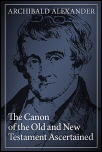
The beginnings of the nineteenth century witnessed mounting objections to the authenticity and divine inspiration of Scripture, prompting individuals both inside and outside the church to question the origin and purpose of the Bible. Where in the Bible is God’s revelation found? What is the difference between Scripture and tradition? Does God’s word take precedence over oral traditions?
In this volume, Archibald Alexander identifies the canon by using the testimony of the early church, along with the internal evidence within the books themselves. He also deals with methodology, including the process whereby a book is canonized. This volume also contains an explicit rebuttal of the work of J.D. Michaelis, one of the early biblical scholars to question the authenticity of the Gospels of Mark and Luke.
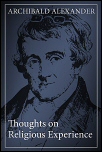
There are two kinds of religious knowledge, says Archibald Alexander: truth revealed in Scripture, and the impression truth makes on individuals—the experience of truth. In Thoughts on Religious Experience, Alexander explains that the truth of God constitutes more than mere religious sentiment, and cautions against overestimating the capabilities of the human mind to identify and determine truth. He also writes at length on aspects of piety, religious conversion, backsliding, and the effects of sanctification in our efforts to identify religious truth.
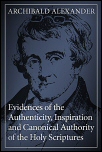
The revelation of God is neither improbably nor unreasonable—in Scripture, or anywhere else. Evidences of the Authenticity, Inspiration, and Canonical Authority of Holy Scripture contains Archibald Alexander’s apologetic for God’s revelation in Scripture. He devotes a significant portion of this volume to determining the truth of Scripture, to the veracity of miracles and fulfilled prophecy, and the credibility of the Gospels.
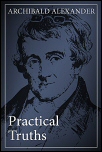
Practical Truths contains forty articles written by Archibald Alexander for the American Messenger, in addition to seven evangelical tracts, six small books, and a vast collection of Alexander’s short works. This volume contains articles, essays, lectures, and sermons on a variety of topics, including heaven, judgment, and missions, as well as numerous stories and other anecdotes.
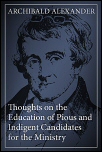
As a professor of theology at Princeton Theological Seminary, Archibald Alexander concerned himself with the training and formation of candidates for ministry. This volume explores the continued necessity of educating ministers in an era of diminished respect for author, where individuals resist dependence on others. Alexander also ponders the church’s duty to support, encourage, and train youth to discern their callings.
In addition to the practical advice contained in this volume, Thoughts on the Education of Pious and Indigent Candidates for the Ministry also offers a revealing glimpse of the early years of Princeton Theological Seminary, including the relationship of seminaries to churches, as well as the state of Presbyterianism in early nineteenth century America.
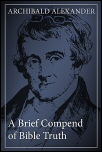
A Brief Compend of Bible Truth contains thirty eight brief chapters on a wide range of theological themes, including the being and nature of God, the content of Scripture, the creation and the fall, the atonement, and much more. This brief system of theology is designed for those unable to study larger and more comprehensive works. It avoids technical language, yet still contains solid arguments, sound reasoning, and the foundation of Scripture.
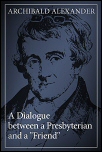
This brief volume contains a hypothetical conversation between two people—one a regular church attendee, and the other attending for the first time. This conversation addresses obstacles which prevent church membership, and reveals the conception of the nineteenth century church from the outside. It also addresses common questions posed by skeptics—everything from church membership to the payment of ministers.
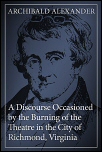
On December 26, 1811, a fire swept through the theater in Richmond, Virginia, burning it to the ground and killing dozens of people inside. This sermon was delivered two weeks later at the Third Presbyterian Church in Philadelphia on January 8, 1812 at the request of students from Virginia who attended the University of Pennsylvania. This sermon not only serves as a tribute to those whose lives were lost, but also recounts the biblical themes of grief and lament.
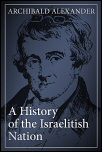
Near the end of his life, Archibald Alexander began working on a detailed history of the nation of Israel. Although the completion of the final proof was interrupted by his death, an unedited draft of the manuscript was published, and widely received.
“The history of the Bible,” says Alexander, “exhibits human nature in its true colors.” This massive work offers important historical and cultural context for reading the Bible.
A History of the Israelitish Nation argues for the importance of historical analysis. Alexander explains how history helps us understand the origin and nature of who we are, making the historical study of Israel an especially important enterprise. Israel’s history is intertwined with the revelation of God—the covenant, promises fulfilled, prophecy foretold, the first religious institutions, the laws of Moses, and the promised Messiah. “The history of the Bible,” says Alexander, “exhibits human nature in its true colors.” This massive work offers important historical and cultural context for reading the Bible.
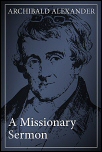
This sermon, first preached in the First Presbyterian Church in Philadelphia on May 23, 1814, explains why Jesus’ command to “go and preach to every nation” represents a new and important era in the history of the church and the world. A Missionary Sermon reminds the church of its obligation to preach, and explores the extent to which the nineteenth century church in America has followed that command.
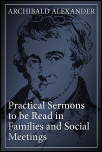
Practical Sermons to be Read in Families and Social Meetings was prepared at the request of the Presbyterian Board of Publication for the benefit of those who could not attend church or regularly hear the preaching of the word. Alexander chose to include sermons suitable for families in need of evangelical truth, which could be read in “fifteen or twenty minutes.” Nearly all of these sermons are focused on Christ, with special emphasis on both redemption and Christ’s love.
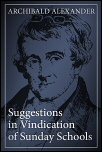
"To know a think accurately, the best method is to teach it." Archibald Alexander’s prescription applies to all learning, but especially theological education. This volume serves not only as an apology for education, but argues for the importance of religious education. It encourages respect for the opinions of others, and is central to the church’s task of educating young people. Suggestions in Vindication of Sunday Schools was first written for the American Sunday School Union—the dominant Sunday school organization at the time—but applies to any context where the church has an interest in the education and formation of young people.
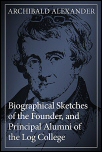
A hundred years prior to the professorship of Archibald Alexander, the Tennent family founded an educational institution in Warminster, Pennsylvania which became known as Log College. This college played a critical role in the establishment of Presbyterianism colleges, and this volume celebrates its hundredth birthday. Authored by Archibald Alexander, this volume sketches the lives of the founders and first alumni of the college. Its revealing glimpse into the early years of Presbyterianism in America during the seventeenth and eighteenth centuries also make this volume an important historical work in its own right.
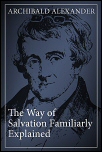
The Way of Salvation Familiarly Explained contains a hypothetical conversation between a father and his four children, explaining the basic principles of Christianity in ordinary language. Although it is intended for children, it serves as a comprehensive theological primer appropriate for any age. In this conversation, Alexander explains weighty doctrines in plain language and understandable terms, including the sin, salvation, and redemption.
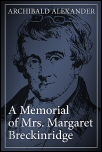
Margaret Breckinridge was a member of the prominent Breckinridge family. She was born in 1802 in New York, and moved first to Princeton and then to Kentucky, where worsening illness forced her to return to Princeton where her life was cut short by death. A Memorial of Mrs. Margaret Breckinridge, written and assembled by Archibald Alexander, was published on the first anniversary after her death. It is divided into two parts, the first containing a memoir and funeral sermon, and the second containing letters to her surviving children.
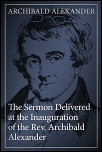
This volume contains material from Archibald Alexander’s inauguration as professor of theology at Princeton Theological Seminary. The first part contains a sermon delivered by Samuel Miller, who at the time was pastor of the Church on Wall Street in New York, and would later become a prominent professor of theology at Princeton. His sermon is written to encourage Alexander in his new vocation, and draws extensively from Paul’s letters to Timothy. The second part of this volume contains Archibald Alexander’s discourse on theological education. He locates theological study—at Princeton in particular—within the entire sweep of church history, determining its contents and reiterating the importance of its subjects in a curriculum for ministry training.
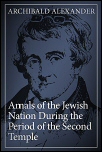
In Annals of the Jewish Nation during the Period of the Second Temple, Archibald Alexander offers a sweeping history of the Israelites. He draws not only from biblical sources, but also from the vast secondary literature on Middle Eastern history. Prominent figures in this volume include Cyrus, Alexander the Great, Ptolemy, Herod, Josephus, and Nero. In this meticulously researched volume, Alexander also chronicles the dissolution of Babylon, the development of the Septuagint, the rise of the Roman Empire, and the destruction of Jerusalem.
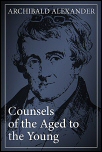
Counsels of the Ages to the Young represents Archibald Alexander’s attempt to bridge the gap between generations. The elderly, he says, are reticent to give advice, and the young people resist taking it. This tract of practical advice draws from Archibald Alexander’s own experience, and aims to bring various generations in the church together. Alexander writes about developing good habits, resisting temptation, and practicing good piety.
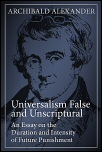
The importance of the question “What happens after we die?” exceeds that of nearly every question ever asked about human existence. Some claim that only a few are saved; others promote universal salvation—and each side harnesses Scripture for their own cause.
In Universalism False and Unscriptural, Archibald Alexander aims to put to rest the misconceptions of universal salvation. He not only argues that universalism directly conflicts with Scripture, but that it also cannot stand on its own merit. In fact, those who promote universalism underestimate the extent of human corruption to their own peril. This helpful volume clarifies what Scripture says about universalism against Alexander’s own critics, and serves as an important guide for today.
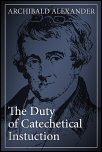
The Duty of Catechetical Instruction serves as a guide for instructing and training young people within the church. In it, Archibald Alexander defends the importance of teaching right doctrine, and helps teachers learn how to make the truths of Christianity sensible. His advice on catechism is firmly rooted in the Scriptural mandate that each generation transmit the faith “to your children’s children.”
Archibald Alexander was born on April 17, 1772 in Rockbridge County, Virginia. He was educated at nearby Liberty Hall, and studied for two years under William Graham. At age 25, he was elected president of Hampden Sydney College in Virginia. Shortly thereafter, he moved to Philadelphia to become pastor of the Third Presbyterian Church. When Princeton Theological Seminary opened in 1812, Archibald Alexander became the first professor of theology, where he served until 1840. Among his students was Charles Hodge, who named his son, A.A. Hodge, after his mentor. Archibald Alexander died in 1851.
Reviews
3 ratings
Allan Story
5/5/2017

Mr. Youngblood
5/13/2015
This is a great collection, I especially appreciate the systematic theology work (Brief Compend), the work on Canon or defense of the Protestant Canon, the brief catechism exhortation, and the apologetical work on Scripture. I may only be a layman, but I highly recommend this collection.
Nathan Shaver
12/27/2013